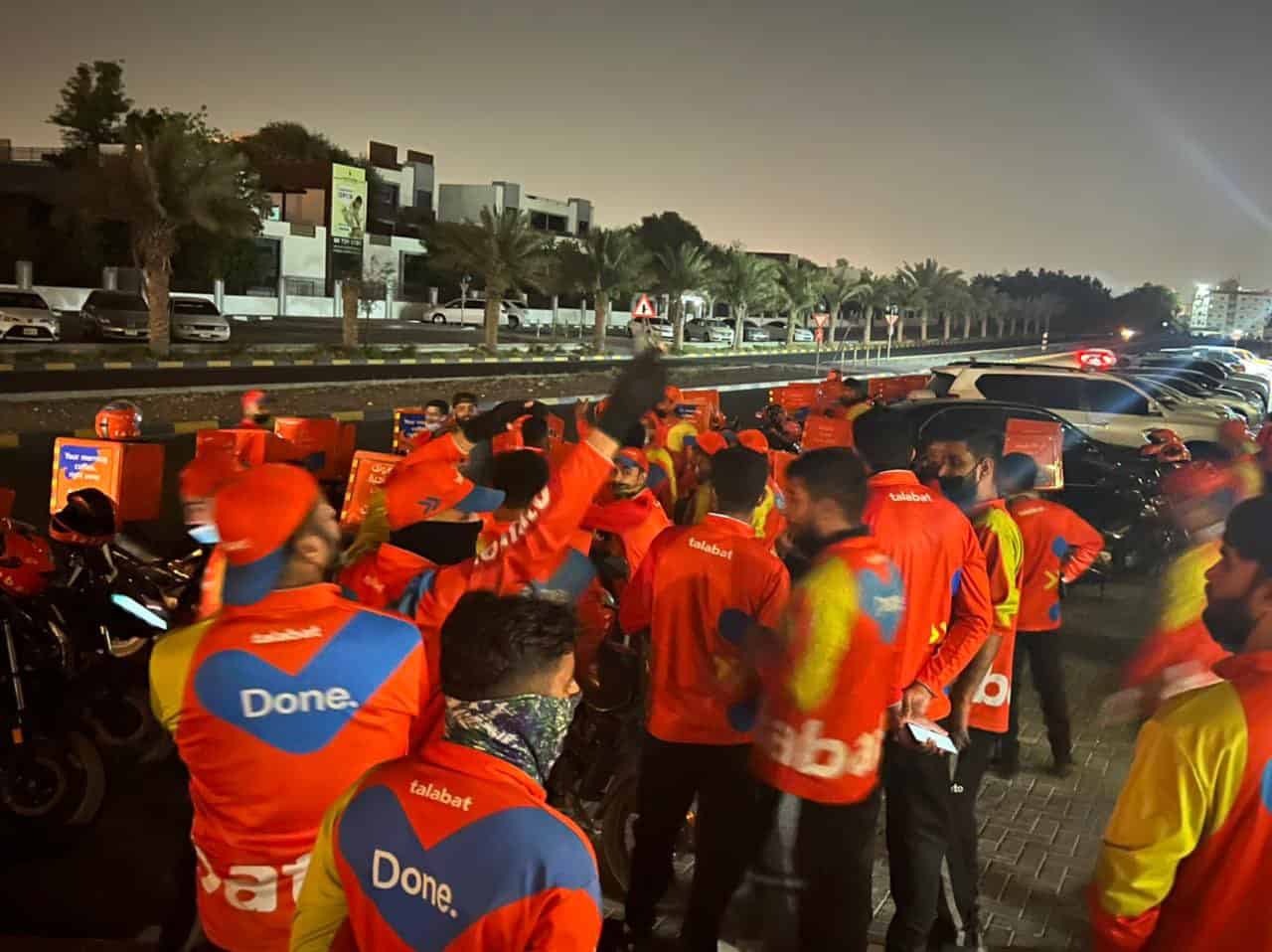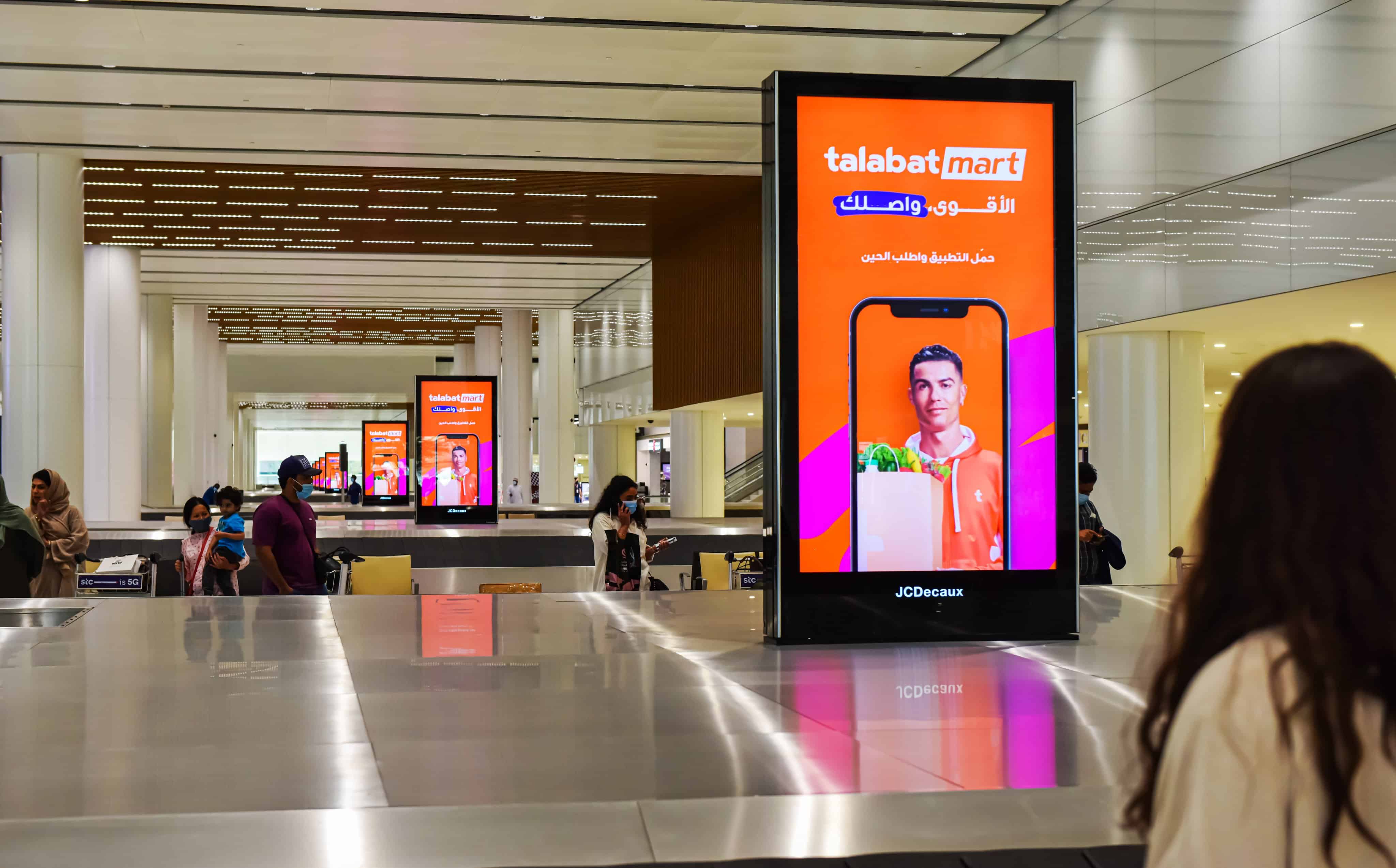Protesting unfair pay and constantly stressful working conditions, riders of delivery platform Talabat went on a strike on Monday. Earlier this month, Deliveroo riders also protested a planned pay cut by the company. These protests have raised eyebrows in a country where such protests are rare.
Over the past three days, social media has been rife with comments demanding better treatment of and pay for riders, with the hashtag #talabatstrike trending on Twitter.
‘Unsustainable’
A Talabat driver, who requested anonymity, said the riders receive AED7.5 per order, while the company pays nearly double that amount to contractors who hire these riders.
Another strike in the UAE, the 2nd this month in a country where strikes are rare and furthermore illegal.
Drivers for Talabat, an Arab food delivery service, are refusing to work tonight and are demanding higher wages. pic.twitter.com/d2vF2TbVcO
— Séamus Malekafzali (@Seamus_Malek) May 9, 2022
He said rising fuel prices have made long-distance deliveries costlier for them.
“I earn roughly AED3,000 every month from which I have to spend AED1,500 on petrol, AED500 on accommodation and roughly AED 600 on meals, so I’m barely left with Dh400 to send home. To make it worse, we are penalized for canceled or damaged orders. During Ramadan, I ended up paying AED480 in penalties. Even our tips are not given to us in full. If a customer pays AED10 as a tip, we get only AED3-4,” he said.
Since these riders, often the sole breadwinners, are in a perpetual rush to deliver in time, every delivery is cherished because they don’t have a monthly salary structure. This makes their job highly risky.
@Talabat are your drivers still on strike? We’re loyal customers but I hope they succeed, you pay them far too low #talabat #talabatstrike
— Stella K (@StellaSilverSun) May 10, 2022
“Last year I met with an accident, dislocated my shoulder and hurt my legs for which I had to pay AED5,000 from my own pocket. I even had to go back to Pakistan for a while to recover. We have to pay for our visas too. I have paid Dh5,500 for a two-year visa yet there’s the constant threat of termination by the contractor,” he added.
“Is this fair? We should at least get AED9 per order to begin with and some basic benefits,” the rider demanded.
Earlier, riders had to cover a radius of 2-3 kilometers, which has now increased to almost 15 kilometers, said Azhar Hussain, a Careem rider.
“Now, for 12 out of 15 orders we have to travel a longer distance, which requires more fuel and that’s quite expensive as petrol prices are touching AED4. Plus, if we are even a few minutes late we get penalized by the customer, the aggregator,” he said. Often the riders are fined for speeding.
#Talabat kindly also look your rider. They also need right pay … Kindly finish the problem. People are Getting hungry. Pay right to your rider they will promote you as well. Not the celebraties…. pic.twitter.com/VWmxXglADx #talabatstrike pic.twitter.com/Ws9YBdh5Wp
— Sardar Akash (@SardarA13689107) May 11, 2022
“We are always on our toes even during the scorching summer months and in return, we are paid peanuts although we’re better off than Talabat riders since we get AED12 per order. But we have to pay the rent for our bikes. Sometimes our only consolation is when customers offer us some water and are not rude to us,” Hussain said.
Many riders wondered why the company was reluctant to better their lot when it could afford to rope in soccer star Cristiano Ronaldo as its brand ambassador in March this year.
In 2021, Ronaldo earned more than $50 million in brand endorsements. Besides Talabat, Ronaldo endorses global brands such as Nike, Tag Heuer. He is the only soccer player with lifetime earnings surpassing $1 billion.
‘Why are riders dissatisfied?’
A Talabat spokesperson recently told the media that until last week, 70 percent of riders had expressed satisfaction with the pay structure, which “saw them earn AED3,500 ($953) a month.”
While being discreet about the number of hours that riders must work to earn that money, the spokesperson asked what led the riders to protest if there hasn’t been any change in the earning pattern.
‘Riders deserve empathy’
Ramadan is a particularly busy and taxing month for riders. Seeing their plight, several individuals, public and private organizations and community-driven initiatives pooled efforts so that the riders could break their fast.
“Think about it, these riders rush to deliver food so that we can break our fast in time, but they can’t afford a decent meal for themselves. That is quite heart-breaking. They are so grateful for a packet of a decent, home-cooked meal. This is truly humbling,” said Nida Sumar, Founder of The Table Project, which has been organizing Ramadan food drives for riders for the past few years.
Riders’ rights must be protected
A fair solution is needed for the currently-disharmonious three-way relationship between riders/aggregators, restaurants and customers.
TRENDS reached out to businesses that use third-party aggregator platforms as well as their own delivery fleet.
Lisa Knight and Chef New, co-founders of Thai restaurant and tea bar Café Isan, said, “Our business has been affected, but our hearts go out to the riders who feel unheard. We’re massively in favor of aggregators switching to a salaried model.”
“It’s safer for a start. Riders are always under tremendous pressure to deliver X number of orders per day, which means they are permanently rushing around. The stress must be constant,” they said.
Ian Ohan, Founder and CEO of KRUSH Brands, which has developed proprietary technology and delivery platform with over 200 delivery drivers, said, “The fundamental issue is the protection of basic human rights and principles of equitable employment.”
Talabat had no problem paying Cristiano Ronaldo 5 million $ for a silly advertisement, rather paying those heroes what they deserve ! #talabat pic.twitter.com/fRhbpebxct
— Ali Malik (@alimushtaq0012) May 10, 2022
Ohan added: “In my view, the first duty of care belongs to these multi-billion-dollar third-party delivery companies that should be ensuring that drivers who wear their uniforms and do their work are treated humanely and paid fairly. Instead, they have outsourced the direct employment of their drivers to an agency to reduce their costs and which affords them plausible deniability vis-a-vis sub-standard driver treatment. What’s more, they leverage their scale to drive the cost down by competing with the various agencies for their business. This creates an unattainable situation for many drivers, which needs to change.”
“The ‘gig’ worker or contracted worker argument that third-party delivery companies have been using to circumvent labor rights around the world is now being rejected by governments. Given third-party delivery’s predisposition to choosing profit over people, perhaps the UAE should follow suit and ensure that contractors are treated as direct employees with full benefits. This includes limited working hours, more balanced incentivization schemes, and the right to self-determination,” Ohan added.
Pointing towards a dilemma, Knight observed, “Here’s the thing, even restaurants [apart from the likes of KRUSH Brands] which offer self-delivery usually resort to third-party logistics firms that also adopt the same agency model. So, unless restaurants hire their own fleets, we end up back at the same place.”
But the question is who would be footing the bill -– restaurants or customers, or both?
Enforce fundamental obligations, but legally
As riders continue to leverage social media to encourage and maintain solidarity by not showing up for work, it is also being pointed out that strikes and such other activities aren’t legal in the UAE.
“No one is above the law, and this applies to every industry, sector, employer and employee,” said Naim Maadad, Chief Executive & Founder of Gates Hospitality.
“The Ministry of Labour’s code of conduct is very well defined and spelled out, so we humbly request everyone to abide and enforce such fundamental obligations. The UAE thrives on a society that is tolerant, multicultural, respectful and applies human rights to the core. It is the responsibility of organizations to ensure due diligence, law enforcement, and well-being is practiced at every level. Strikes amongst other disruptive activities are not acceptable and we strongly suggest to all involved to seek legal assistance and support by respective parties to enforce the law and work in harmony,” he said.
‘Dialogue needed’
Tapan Vaidya, CEO of PJP Investments Group, owner and operator of Papa John’s Pizza in the UAE & Saudi Arabia, calls for a dialogue to resolve the crisis.
“Such strikes never allow true progress towards homogeneous satisfaction for all parties involved. It affects the wages of riders and businesses of aggregators and results in unhappy customers. The latter inevitably move on to another platform resulting in further erosion of the first two parties’ interests,” he said.
“Thus, meaningful dialogue between riders and aggregator management is the best scenario forward. However, there is never smoke without fire. Riders have grievances, get them addressed fairly, and they would be more than willing to ensure their wages continue. Ultimately the customer’s interests are paramount,” he added.
‘Patience need of the hour’
Part of the responsibility to ensure humane treatment of riders also falls on customers ordering on various aggregator platforms. Dissatisfied customers throwing a fit is not an uncommon sight.
“A 10-minute delay in delivery and some customers create a ruckus,” said Sumar, who sells homemade delicacies online.
“Having the convenience of doorstep delivery is great, but customers must be mindful that it comes at a cost. And it’s the riders who, unfortunately, are most impacted due to unrealistic delivery expectations. Hence, change will come only when customers are also willing to take equal responsibility – accepting slower delivery timelines might be a good start,” Sumar added.










